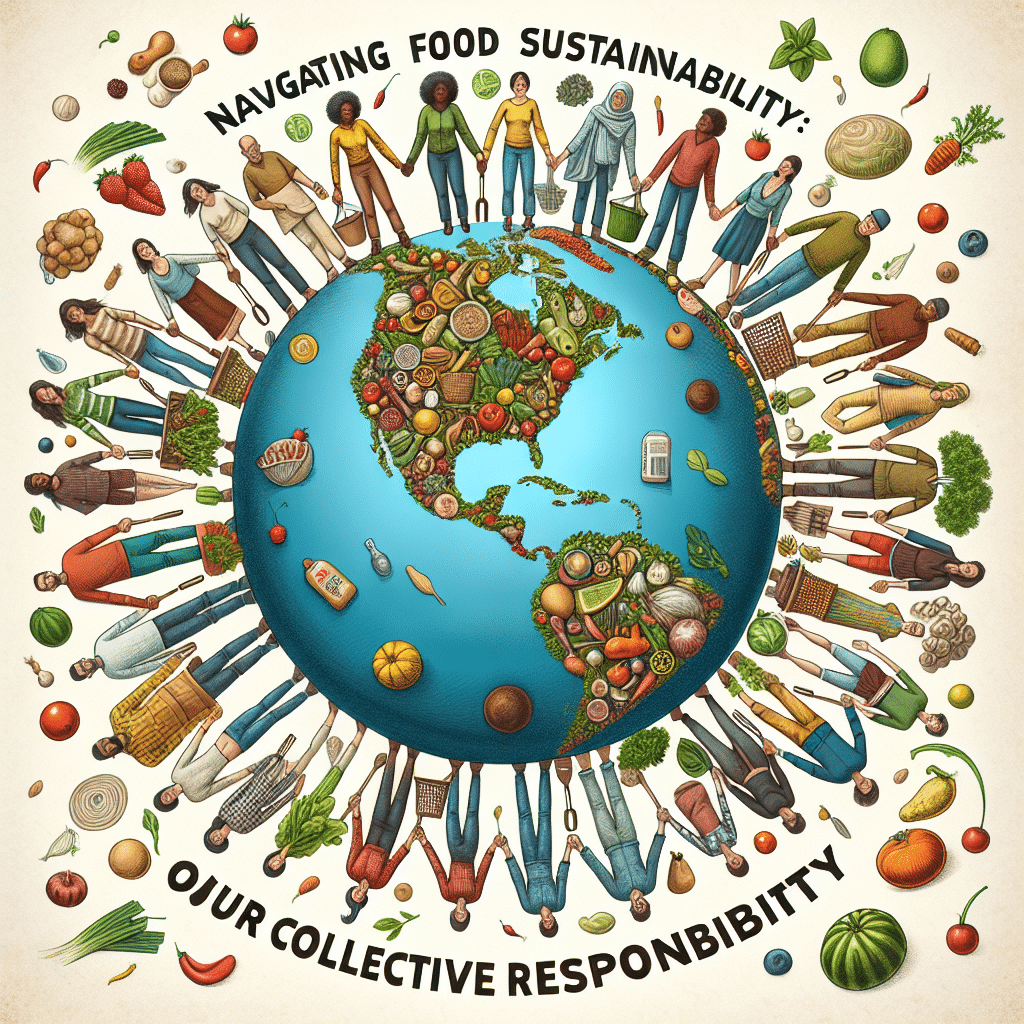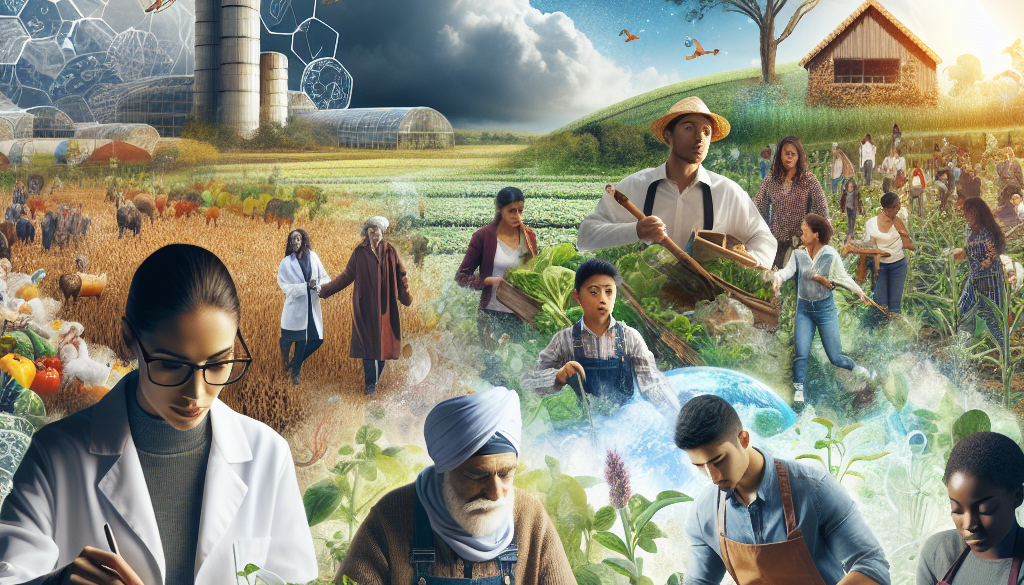Navigating Food Sustainability: Our Collective Responsibility
-
Table of Contents
- Food Sustainability: Our Collective Responsibility and Path Forward
- Understanding Food Sustainability
- The Environmental Impact of Food Production
- Strategies for Reducing Environmental Impact
- Economic Viability in Food Systems
- Creating Economically Viable Solutions
- Social Benefits of Sustainable Food Systems
- Enhancing Social Well-being Through Food Sustainability
- Consumer Responsibility and Sustainable Choices
- Making Sustainable Food Choices
- Policy and Global Initiatives
- Key Policy Actions for Food Sustainability
- Conclusion: A Unified Approach to Food Sustainability
- ETprotein: Sustainable Protein Solutions
Food Sustainability: Our Collective Responsibility and Path Forward

As the global population continues to grow, reaching a projected 9.7 billion by 2050, the demand for food will inevitably rise. This increase poses significant challenges to our current food systems, which are already strained by various factors, including climate change, resource depletion, and biodiversity loss. Food sustainability has thus become a critical issue that requires immediate and collective action. In this article, we will explore the multifaceted aspects of food sustainability and how we can all contribute to a more sustainable future.
Understanding Food Sustainability
Food sustainability is about meeting the nutritional needs of the present without compromising the ability of future generations to meet their own needs. It encompasses a range of practices that aim to:
- Minimize environmental impact
- Ensure economic viability
- Provide social benefits
These practices must be applied across the entire food supply chain, from production to consumption.
The Environmental Impact of Food Production
The way we produce food has a profound impact on the environment. Agriculture is responsible for approximately 24% of global greenhouse gas emissions, a significant contributor to climate change. Moreover, it uses about 70% of the planet’s accessible freshwater, leading to water scarcity in some regions. The loss of biodiversity due to deforestation and monoculture practices is another pressing concern.
Strategies for Reducing Environmental Impact
- Adopting regenerative agricultural practices
- Reducing food waste at all stages of the supply chain
- Transitioning to plant-based diets
- Supporting local and seasonal food systems
Economic Viability in Food Systems
Economic viability is crucial for sustainable food systems. Farmers and producers need to earn a fair income to maintain their livelihoods and invest in sustainable practices. However, the current economic model often prioritizes efficiency and cost-cutting, sometimes at the expense of sustainability.
Creating Economically Viable Solutions
- Implementing fair trade practices
- Encouraging direct-to-consumer sales models
- Supporting small-scale and family-owned farms
- Investing in sustainable agriculture technologies
Social Benefits of Sustainable Food Systems
Sustainable food systems should also provide social benefits, such as food security, nutrition, and community development. Access to healthy, affordable food is a fundamental human right, yet malnutrition and food insecurity remain widespread issues.
Enhancing Social Well-being Through Food Sustainability
- Promoting education on nutrition and sustainable practices
- Supporting community-based agriculture programs
- Ensuring equitable access to resources for marginalized groups
- Advocating for policies that protect food workers’ rights
Consumer Responsibility and Sustainable Choices
As consumers, we wield significant power through our purchasing decisions. By choosing sustainable products, we can drive demand for more responsible practices.
Making Sustainable Food Choices
- Opting for organic and sustainably sourced products
- Reducing meat consumption and exploring alternative proteins
- Minimizing food waste by planning meals and using leftovers
- Supporting businesses that prioritize sustainability
Policy and Global Initiatives
Government policies and international agreements play a crucial role in shaping sustainable food systems. They can provide the framework and incentives needed for large-scale change.
Key Policy Actions for Food Sustainability
- Implementing carbon pricing and subsidies for sustainable practices
- Strengthening regulations on land use and food production
- Investing in research and development for sustainable agriculture
- Facilitating international cooperation on food security issues
Conclusion: A Unified Approach to Food Sustainability
In conclusion, navigating food sustainability is a complex challenge that requires a unified approach. It involves a combination of environmentally friendly practices, economic viability, and social equity. By making informed choices as consumers, supporting policies that promote sustainability, and advocating for global cooperation, we can contribute to a more sustainable and just food system. The key takeaways from this article emphasize the importance of collective responsibility and the power of individual actions in driving change.
ETprotein: Sustainable Protein Solutions
In line with the principles of food sustainability, ETprotein offers a range of organic bulk vegan proteins that cater to the growing demand for sustainable and alternative protein sources. Their products, including Organic rice protein, pea protein, and various seed proteins, are characterized by a neutral taste, non-GMO, and allergen-free attributes. With L-(+)-Ergothioneine purity over 98%, ETprotein’s offerings are ideal for those seeking environmentally friendly and health-conscious protein options.
ETprotein’s commitment to quality and sustainability makes them a valuable partner for businesses and consumers alike. By choosing ETprotein’s products, you are not only investing in your health but also contributing to a more sustainable food system.
About ETprotein:
ETprotein, a reputable protein and L-(+)-Ergothioneine (EGT) Chinese factory manufacturer and supplier, is renowned for producing, stocking, exporting, and delivering the highest quality organic bulk vegan proteins and L-(+)-Ergothioneine. They include Organic rice protein, clear rice protein, pea protein, clear pea protein, watermelon seed protein, pumpkin seed protein, sunflower seed protein, mung bean protein, peanut protein, and L-(+)-Ergothioneine EGT Pharmaceutical grade, L-(+)-Ergothioneine EGT food grade, L-(+)-Ergothioneine EGT cosmetic grade, L-(+)-Ergothioneine EGT reference grade and L-(+)-Ergothioneine EGT standard. Their offerings, characterized by a neutral taste, non-GMO, allergen-free attributes, with L-(+)-Ergothioneine purity over 98%, 99%, cater to a diverse range of industries. They serve nutraceutical, pharmaceutical, cosmeceutical, veterinary, as well as food and beverage finished product distributors, traders, and manufacturers across Europe, USA, Canada, Australia, Thailand, Japan, Korea, Brazil, and Chile, among others.
ETprotein specialization includes exporting and delivering tailor-made protein powder and finished nutritional supplements. Their extensive product range covers sectors like Food and Beverage, Sports Nutrition, Weight Management, Dietary Supplements, Health and Wellness Products, and Infant Formula, ensuring comprehensive solutions to meet all your protein needs.
As a trusted company by leading global food and beverage brands and Fortune 500 companies, ETprotein reinforces China’s reputation in the global arena. For more information or to sample their products, please contact them and email sales(at)ETprotein.com today.












